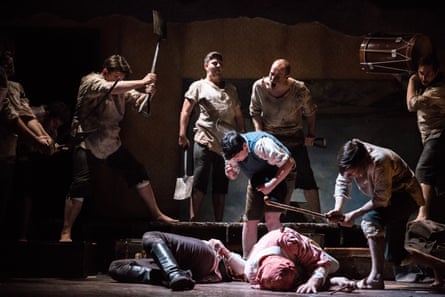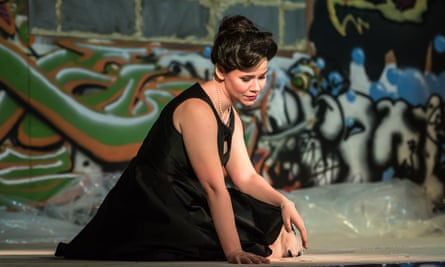It’s been no week for the faint-hearted (and we’re not talking about world politics… although, inevitably, we are). Two new productions of operas notable for their evocation of deadly tyranny made their London audiences gasp and wince – but also sent them away reflecting on the dark evolution of societies that allow hatred of “the other” to gain the upper hand.
The Guardian’s product and service reviews are independent and are in no way influenced by any advertiser or commercial initiative. We will earn a commission from the retailer if you buy something through an affiliate link. Learn more.
“The times are so strange that it’s impossible to tell if you’ll survive them,” wrote Karl Amadeus Hartmann of his native Germany in the 1930s. His way of coping with National Socialism was not to flee but to stay, witness the regime at work and resist by composing subversive testimonies for performance after the inevitable collapse. And so his 1936 opera Simplicius Simplicissimus was not heard until 1948. He revised it in 1957, the version that finally made its way on to the British stage for the first time last week.
The gore flowed freely, to the point where the audience took refuge in nervous laughter,
Hartmann took the thirty years’ war as his parallel, adapting Grimmelshausen’s 1668 novel of the same name. Between 1618 and 1648, Germany’s population dropped from 12 million to 4 million as competing armies swept across the land, killing, looting and spreading plague. Simplicius, a simpleton boy shepherd, is caught up in this carnage but survives and transcends it, raised to the status of a holy fool, the only one allowed to speak truth to power and predict its demise.
Polly Graham’s intensely physical production for Independent Opera cleverly moves between 17th- and 20th-century Germany, underscoring that, whatever the era, war will always brutalise its protagonists. That brutality, vividly choreographed by Michael Spenceley, was chiefly portrayed by a team of eight young male singers, required to play, variously, swaggering troops, poor peasants, Hitler youth and placid sheep. Their beefy heft as they charged around Nate Gibson’s set gave the production much of its drive, following the example of baritone William Dazeley as the deeply menacing and universal Soldier who, when not killing and raping, taunts and ridicules poor Simplicius.
Soprano Stephanie Corley portrayed the simple shepherd with touching sensitivity, and was particularly affecting when laying the gentle Hermit (Adrian Thompson) in his grave, a brief respite from the whirling terror. When it returned, the troops had captured a lone woman (Chiara Vinci), abusing and humiliating her in front of the venal, repulsive Governor (Mark Le Brocq). Vinci represented all women caught up in war in her impressively balletic performance, her agony ending only when Simplicius intervened to foretell the downfall of such tyranny.
David Pountney’s new translation is suitably crude and direct; and Timothy Redmond conducted the Britten Sinfonia with admirable commitment to Hartmann’s bracing score, which while short of sinuous vocal lines has an attractive modernist palette all its own, despite the nods to Stravinsky, Borodin and Bach.

“I’m much more interested in the run-down and the squalid than the beautiful and glamorous,” says new firebrand opera director Gerard Jones. “I think glamour is a false path for telling stories.” Certainly, no one would apply “beautiful” or “glamorous” to the look of his dystopian imagining of Handel’s Oreste, this year’s Jette Parker Young Artists offering from the Royal Opera, but its unsparing portrayal of a violent, amoral society in freefall marks him out as a director with a powerful sense of the relevant and a determination never to sugar the pill.
Handel hastily assembled his pasticcio opera from previous compositions in order to showcase a starry cast at Covent Garden in 1734, and it makes an intriguing vehicle for today’s new talent. They didn’t disappoint.
Taken from Euripedes, the opera tells of Oreste, who, deranged by his matricide, consults the Oracle and seeks respite on the shores of Tauris. The Oracle turns out to be a lousy travel agent: King Toante, the island’s despotic ruler, has decreed all strangers be put to death. Unbeknown to Oreste, his sister Ifigenia is chief executioner, killing hapless refugees with a hammer. She is assisted by the psychotic Filotete, who captures Oreste’s wife, Ermione, and his friend Pilade, who have arrived on the island to look for Oreste.
Every character in Jones’s production is deeply damaged, and none is allowed the heroism the music suggests. The gore flowed freely in the bleak, graffiti-daubed set, to the point where the audience took refuge in nervous laughter, perhaps finding the place that Jones seeks in his schlock-horror realisation – “where not funny meets funny”.

Whether that’s ever a good place to be is a moot point, but his twist at the close, subverting the conventional expression of undying devotion, was a clever surprise. And no one would disagree that, musically, this was a hit. Angela Simkin as Oreste was indisposed when I attended, her place taken by established countertenor Russell Harcourt. He’s an impressive Handelian, with a thrilling top register and assured technique. Baritone Simon Shibambu (King Toante) does a nice line in menace and sings with cool authority, if a little rushed at times. The tenor Thomas Atkins (Pilade) impressed with his fluent dispatch of some high-octane arias, and Vlada Borovko (Ermione) brought the house down with her furious demisemiquavers. Jennifer Davis (Ifigenia) possesses a voice of rare beauty, lamenting her appalling situation with real warmth and tenderness, and baritone Gyula Nagy (Filotete) sings and acts with such extraordinary intensity that he demands attention.
The conductor James Hendry, at just 24, is definitely a name to watch. He drove the valiant Southbank Sinfonia with consummate ease, ensuring that whatever mayhem was happening on stage the music maintained a thrilling focus.
Star ratings (out of 5)
Simplicius Simplicissimus ★★★★
Oreste ★★★

Comments (…)
Sign in or create your Guardian account to join the discussion